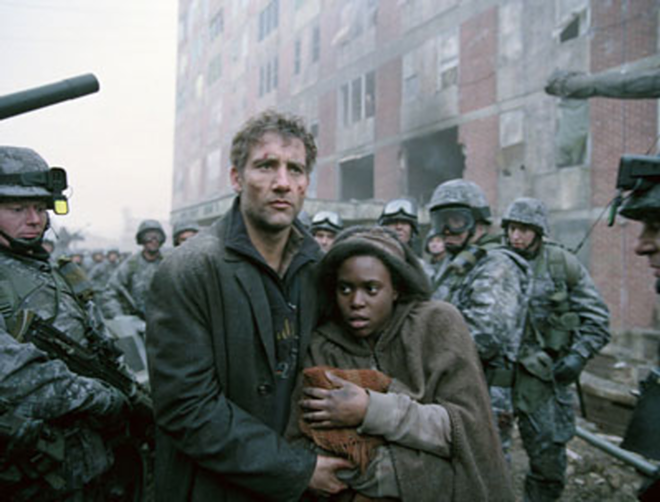
A crowd in a London bistro silently watches the TV news bulletin that the world's youngest person has died at the age of 18 years old.
And Alfonso Cuarón draws you into Children of Men.
A little girl draws a door on a wall with a piece of chalk, then steps into a perilous realm of fairies and bogeymen.
And Guillermo del Toro entices you into Pan's Labyrinth.
A man stands calmly at the base of a gnarled tree in a huge, transparent globe, hurtling through outer space.
And Darren Aronofsky transports you into The Fountain.
Some of the finest movies of 2006 usher audiences into times and places of wild imagination. That's not necessarily a new function of film; part of the magic of motion pictures is to create dreamlike, mythic worlds, from Oz to Middle-Earth. Usually, however, film fantasies unfold in an epic mode of superheroics or star wars, and provide an abundance of ancillary merchandise.
You're unlikely to find Children of Men action figures or Pan's Labyrinth tie-in breakfast cereal. This year's films resemble the idiosyncratic, political big-screen science fiction of the late 1960s and early '70s, along the lines of 2001: A Space Odyssey or Soylent Green. They're not rousing tales of escapism but knotty, deeply personal explorations, and the major ones could not be more unalike, except in their ambition and inventiveness.
The Fountain emerged as a proverbial labor of love. Aronofsky first attempted to make the film as an expensive, conventional-sounding sci-fi epic with Brad Pitt, only to see the production founder at the 11th hour. For the stripped-down, introspective new version, the director enlisted Hugh Jackman as a star-crossed lover crossing the centuries. The ambiguity of its plotting and blend of Eastern and Christian spirituality put off some critics, but The Fountain remains a film of intricate, nearly inexplicable beauty.
Guillermo del Toro has already established himself as one of cinema's most intriguing fantasists with action romps such as Hellboy and smaller ghost stories such as The Devil's Backbone. He fuses his obsessions for monster effects and cultural lore in his masterpiece, Pan's Labyrinth. History informs del Toro's bedtime story for adults, as victorious Fascists hunt down the rag-tag resistance in Spain of 1944. Even without the supernatural themes, we'd be fascinated with the period-piece, coming-of-age story of young Ofelia (Ivana Baquero), brought to the mountain base of Vidal (Sergi López), who's not just a wicked stepfather but a well-drawn, sadistic army officer.
Ofelia encounters magical creatures, including a sinister faun, who appears to be a hybrid of man, goat and plant. The faun gives her tasks so dangerous, involving sights both lovely and horrific, that it becomes difficult to tell whether the fantasy realm is any better than the real one. Throughout the film, del Toro crafts images worthy of Goya or Bosch, including a ghoul with eyes in its palms; to see, it holds its hands up to its face, fanning fingers over its brow. By refusing to sugarcoat real-world tragedies, Pan's Labyrinth digs under your skin.
Another Mexican filmmaker, Alfonso Cuarón, crafted unique children's fantasies in A Little Princess and Harry Potter and the Prisoner of Azkaban. With Children of Men, he applies more adult themes to a unique sci-fi premise. The film takes place in London in 2027 during an ongoing plague of global infertility; no child has been born in 18 years.
Cuarón takes significant liberties with the original novel by English mystery writer P.D. James. The book conveys a sense of the end of history, with the world slowly grinding to a halt. Cuarón's England, instead, is tearing itself apart in conflicts with Orwellian troops, religious sects and terrorist cells. Jaded civil servant Theo (Clive Owen) finds himself drawn into a resistance group by his ex-wife (Julianne Moore) and becomes the reluctant guardian of a young woman (Claire-Hope Ashitey) harboring a miraculous secret.
Apart from some brief futuristic details such as holographic billboards and motorized rickshaws, this low-tech, contemporary-looking film rarely seems like science fiction. Neither the book nor the film devotes much time to explain the pandemic of childlessness, but Cuarón departs from the text to evoke anti-immigration hysteria, homeland security and the abuses of Abu Ghraib. His stunningly effective scenes of urban warfare could easily take place in Baghdad or in Ireland at the height of the Troubles.
The themes of infertility and civil unrest finally dovetail in a breathless, virtually wordless sequence near the end of the film that makes a remarkably touching plea for people to treasure life and our shared humanity in a war-torn, polarized world. It's probably no coincidence that Children of Men was released on Christmas Day, and its rich ideas about social conflict and the mysteries of faith support multiple interpretations.
Cuarón, del Toro and Aronofsky weren't the only artists this year to use speculative fiction to craft unique works of self-expression. In C.S.A.: The Confederate States of America, director Kevin Willmott used a Southern Civil War victory to meditate on the racist corners of American history. On television, the creators of Battlestar Galactica found dark and abundant metaphors for contemporary politics and personal foibles. Worlds apart, the big- and small-screen fantasies of 2006 shared an insight into human character. Although they peer deeply into the recesses of the imagination, they also perceive the secrets of the heart.

